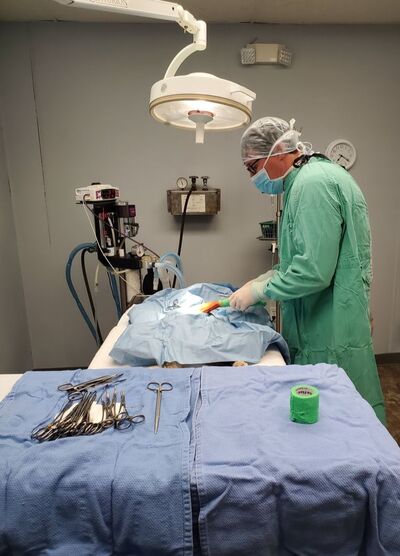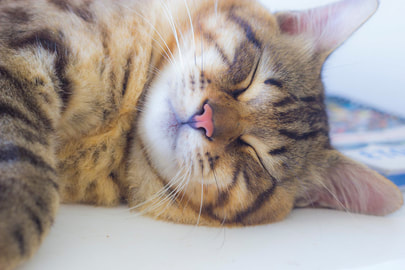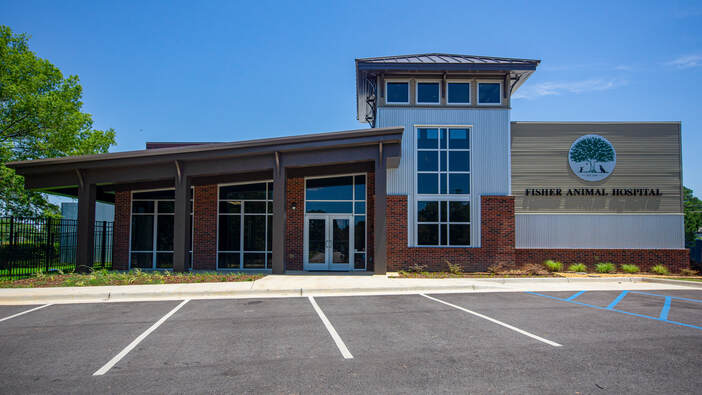Surgery

At Fisher Animal Hospital, our veterinarians are well trained for a number of different soft tissue, orthopedic and cosmetic surgical procedures. Any pet undergoing a surgical procedure will be thoroughly examined, given pre-op pain medications and recommended blood tests and IV catheter placement will be completed prior to surgery.
Many pet owners worry about their pets undergoing anesthesia. Any pet that undergoes anesthesia at Fisher Animal Hospital will undergo a physical exam and recommended blood screening tests and IV catheterization to minimize any risks. All anesthetic procedures are attended by a trained and dedicated veterinary technician who monitors the patient's heart rate, respiratory rate, blood pressure and blood oxygenation during the procedure.
Spay and Neuter Services
The most common surgical procedure performed is ovariohysterectomy (spay) and castration. Spaying and neutering are important aspects of your pets life and well being. Benefits to spaying and neutering your pets include avoiding an unintended pregnancy, decreasing the chances of developing certain forms of cancer, and may decrease aggressive behavior. If your pet has not been spayed or neutered, call us today to schedule an appointment!
Many pet owners worry about their pets undergoing anesthesia. Any pet that undergoes anesthesia at Fisher Animal Hospital will undergo a physical exam and recommended blood screening tests and IV catheterization to minimize any risks. All anesthetic procedures are attended by a trained and dedicated veterinary technician who monitors the patient's heart rate, respiratory rate, blood pressure and blood oxygenation during the procedure.
Spay and Neuter Services
The most common surgical procedure performed is ovariohysterectomy (spay) and castration. Spaying and neutering are important aspects of your pets life and well being. Benefits to spaying and neutering your pets include avoiding an unintended pregnancy, decreasing the chances of developing certain forms of cancer, and may decrease aggressive behavior. If your pet has not been spayed or neutered, call us today to schedule an appointment!
General Surgery
All doctors at Fisher Animal Hospital are well trained in a variety of soft tissue surgical procedures. These include, but not limited to mass removals, intestinal biopsy, intestinal resection and anastomosis, splenectomy, hepatic biopsy and cystotomy. Before any surgical procedure, all doctors are happy to answer any questions or concerns that you may have, and discuss possible complications related to the specific procedure that your pet undergoes.
Orthopedic Surgery
Dr. Fisher has several years experience with orthopedic surgical procedures. Dr. Fisher has a special interest in orthopedic surgery and completed an Association of Orthopedics of North America veterinary course hosted at Ohio State to become more competent in cruciate ligament repair, fracture repair and patellar luxation corrective surgeries. Epidural pain management will be given in addition to pre-operative pain medications when a pet undergoes an orthopedic procedure to keep the patient safe and comfortable. In the instance where advanced expertise is warranted, board certified veterinary orthopedic surgeons are utilized to ensure that your pet receives the highest quality of surgical care and attention.
All doctors at Fisher Animal Hospital are well trained in a variety of soft tissue surgical procedures. These include, but not limited to mass removals, intestinal biopsy, intestinal resection and anastomosis, splenectomy, hepatic biopsy and cystotomy. Before any surgical procedure, all doctors are happy to answer any questions or concerns that you may have, and discuss possible complications related to the specific procedure that your pet undergoes.
Orthopedic Surgery
Dr. Fisher has several years experience with orthopedic surgical procedures. Dr. Fisher has a special interest in orthopedic surgery and completed an Association of Orthopedics of North America veterinary course hosted at Ohio State to become more competent in cruciate ligament repair, fracture repair and patellar luxation corrective surgeries. Epidural pain management will be given in addition to pre-operative pain medications when a pet undergoes an orthopedic procedure to keep the patient safe and comfortable. In the instance where advanced expertise is warranted, board certified veterinary orthopedic surgeons are utilized to ensure that your pet receives the highest quality of surgical care and attention.
What to Expect
It is important to prepare for your pet's surgery day. At Fisher Animal Hospital, surgeries are performed on weekday mornings. Be sure to call ahead at 256-766-0343 to schedule a surgical appointment as walk in surgeries are not permitted. Your pet may not receive food of any sort after 10:00 pm of the day before surgery including the morning of the surgery also. However, water is allowed during this time of fasting. Surgical patients will need to be checked in between 7:30 am to 8:00 am on the day of the procedure. If this does not work with your schedule we will be happy to board your pet overnight and handle all preparations prior to your pet's surgery. Once you check your pet in, you will speak with a knowledgeable staff member about any details concerning the surgery such as recommended blood tests, IV catheters or other services to be completed during your pets visit. Some of our surgeries are considered outpatient surgeries and pets will be allowed to return home that same afternoon after 3:00 pm. Your Fisher Animal Hospital staff member will inform you of your pet's expected pick up time.
After check in, your pet will undergo a thorough physical exam and then receive a pre-op pain medication injection. This injection helps prepare your pet for anesthesia and keeps patients comfortable throughout the procedure and afterward. Once the pain medication has taken effect, your pet will begin anesthesia and surgical preparation. This will include shaving all hair surrounding the surgery site. A soft endotracheal tube will be placed in your pet's airway to allow safe administration of inhaled anesthetic gases.
It is important to prepare for your pet's surgery day. At Fisher Animal Hospital, surgeries are performed on weekday mornings. Be sure to call ahead at 256-766-0343 to schedule a surgical appointment as walk in surgeries are not permitted. Your pet may not receive food of any sort after 10:00 pm of the day before surgery including the morning of the surgery also. However, water is allowed during this time of fasting. Surgical patients will need to be checked in between 7:30 am to 8:00 am on the day of the procedure. If this does not work with your schedule we will be happy to board your pet overnight and handle all preparations prior to your pet's surgery. Once you check your pet in, you will speak with a knowledgeable staff member about any details concerning the surgery such as recommended blood tests, IV catheters or other services to be completed during your pets visit. Some of our surgeries are considered outpatient surgeries and pets will be allowed to return home that same afternoon after 3:00 pm. Your Fisher Animal Hospital staff member will inform you of your pet's expected pick up time.
After check in, your pet will undergo a thorough physical exam and then receive a pre-op pain medication injection. This injection helps prepare your pet for anesthesia and keeps patients comfortable throughout the procedure and afterward. Once the pain medication has taken effect, your pet will begin anesthesia and surgical preparation. This will include shaving all hair surrounding the surgery site. A soft endotracheal tube will be placed in your pet's airway to allow safe administration of inhaled anesthetic gases.

Throughout the procedure one of our dedicated veterinary assistants will monitor the patient's heart rate, respiratory rate, blood pressure and blood oxygenation while your veterinarian works to complete the surgical procedure. After the surgery is complete, the patient is slowly taken off of anesthesia and allowed to recover under the dutiful watch of our caring assistants.
As your pet recovers we will watch for signs of discomfort and any indication that excessive licking or chewing of the incision is likely. Many pets will be sent home with E-collars or neck pillows to prevent the pet from interfering with the incision's healing. Most incision take 7 to 14 days to heal. If any staples or sutures (stitches) are visible outside of the skin, they will need to be removed in 10 to 14 days by one of our staff members. It is important that you check your pet's incision often in case any complications occur.
As your pet recovers we will watch for signs of discomfort and any indication that excessive licking or chewing of the incision is likely. Many pets will be sent home with E-collars or neck pillows to prevent the pet from interfering with the incision's healing. Most incision take 7 to 14 days to heal. If any staples or sutures (stitches) are visible outside of the skin, they will need to be removed in 10 to 14 days by one of our staff members. It is important that you check your pet's incision often in case any complications occur.

